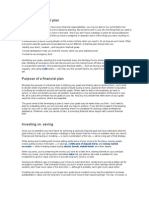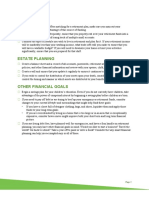SETTING FINANCIAL GOAL
Finance goals can help you find effective ways to spend and save money, both at work and in your
personal life. In the long term, these aspirations can help you improve your lifestyle, reduce debt and
plan for a comfortable retirement. Learning more about these goals can help you create a financial plan
that fits your lifestyle.
Why are financial goals important?
Financial goals are important because they can help fund your lifestyle, helping you meet both personal
and professional objectives.. It's helpful to divide them into short, medium and long-term objectives. In
the short term, it's helpful to reduce debt, create a savings account and create a budget that
accommodates your lifestyle. In the medium and long term, it's useful to focus on financial stability and
retirement planning. These are some of the benefits of creating financial goals:
It can lead to financial freedom.
It increases your chances of having a comfortable retirement.
It can help you reduce or eliminate debt.
It can help you save money for emergency situations
It can help you and your family have a better lifestyle
When Setting Financial Goals, they can generally be categorized into three main types:
Short- Term Financial Goals- are goals you want to achieve in less than a year, such as buying a new
phone, saving for a trip, or paying off a small amount of debt. These goals are usually low risk, meaning
you are unlikely to lose money or face unexpected costs. To reach these goals, you need to budget your
income and expenses, and save a portion of your money in a safe and accessible place, such as a bank
account or a money jar.
Medium- Term Financial Goals- are the ones you want to achieve in one to five years, such as buying a
car, saving for college, or starting a business. These goals are usually moderate risk, meaning you may
face some uncertainty or fluctuations in your income, expenses, or returns. To reach these goals, you
need to plan your income and expenses, and invest a portion of your money in a diversified and flexible
way, such as a mutual fund or a certificate of deposit.
Long- Term Financial Goals- are the ones you want to achieve in more than five years, such as buying a
house, saving for retirement, or leaving a legacy. These goals are usually high risk, meaning you may face
significant changes or challenges in your income, expenses, or returns. To reach these goals, you need to
project your income and expenses, and invest a portion of your money in a growth-oriented and long-
lasting way, such as a stock or a bond.
�Finance Goals: 10 Examples and Why They Matter
Here are 10 examples of financial goals you can apply to your life:
1. Signing up for a retirement plan
A retirement plan is a strategy to accumulate wealth throughout your career. Once you stop working, it
can provide you with substantial savings to fund your lifestyle. Before you start saving, it's important to
set a retirement goal.
You can do this by determining the amount of money you're willing to save for every paycheck you earn
and then calculating your total savings. Some employers may also match the amount of money you
redirect towards your savings, increasing your saving potential. Signing up for a retirement plan can give
you increased financial security and help you prepare for whatever comes after your career.
2. Funding a vacation
As an employee, taking a vacation is an opportunity to alleviate work-related stress and recharge before
returning to the office. Vacations also allow you to spend time with your family and friends, helping you
create a healthy work-life balance. Financing a vacation is an appropriate example of a financial goal
that you can set. Research the travel and accommodation costs and consider the amount of money you
may need for food, souvenirs and sightseeing activities. It can also be helpful to assess your financial
status before leaving so you have resources for other priorities in your life.
3. Resolving student loan debt
Paying for college tuition, campus housing and supplies may require assistance from student loan
programs. If you continue your education after completing a bachelor's degree, you may accumulate
additional student loan debt. Consider setting a financial goal to repay your student loans within a
certain time period. You can identify the amount of money you can afford to pay toward the loan while
still covering your regular expenses. Resolving student loan debt can give you increased financial
freedom and help you pursue things you love.
4. Settling credit card debt
Settling credit card debt can give you the freedom to focus on other expenses and build a better
lifestyle. Start by determining how much you can repay every month and make sure not to add any extra
debt. Once you set a goal, make sure to make your payments every month. You can also establish a
schedule for using the card in the future. For example, you may decide to add charges only during the
holiday season or in emergency situations.
5. Becoming a homeowner
�Another example of a financial goal is purchasing your own home. Consider saving money so that you
can relocate to a city that matches your interests. For example, if you want to live in a downtown area,
then you might save to own a condo or townhouse. If you want to live in a quiet neighborhood, then
you might buy a house in a suburban area. Before you purchase a home, make sure to create a budget
that accounts for mortgage payments, repairs and other routine expenses without compromising your
daily financial requirements.
6. Launching a business
At some point in your career, you may decide to transition into entrepreneurship. Becoming a business
owner can be expensive, as you're responsible for building and maintaining its operations. You can
estimate the amount of money that renting or buying a building may cost. You can also consider how
much you can compensate the people who work for the business and the rates of the services you can
provide to clients. Other relevant costs can include:
7. Paying college tuition
To avoid student loan debt, you may choose to pay for your college education by yourself. Start by
finding a job that can help you cover your tuition costs. You can also consider how much it may cost you
to be a full-time student versus a part-time student. If you're attending an expensive school, meet with
your advisor and see if you can extend your graduation date to reduce financial stress.
8. Reserving money for emergencies
An emergency fund is a sum of money you can use for unforeseen circumstances, such as natural
disasters, medical emergencies or unplanned home repair requirements. It can allow you to pay
unexpected bills while still handling your normal expenses. It can also help you avoid accumulating more
debt. Consider building and maintaining an emergency fund for your personal and professional interests.
9. Finding a higher-paying job
Another financial goal is to earn a higher salary as your career evolves. You can assess your current
earning potential and find ways to boost it, which may include advancing your education or requesting a
wage increase from your employer. Earning more money from your job can give you additional funds to
spend in areas of your life outside the workplace.
10. Enjoying financial freedom
Financial freedom is the ability to use your financial resources without concerns about overspending.
For instance, if you want to travel for a special occasion, having financial freedom allows you to be
comfortable with paying for the flight and accommodation. While financial freedom is usually a long-
�term goal, you can start by establishing short-term objectives, like paying off student loans and credit
card debt. This can reduce your expenses, giving you greater saving potential.
Tips for setting and achieving financial goals
Prioritize your goals. Since you’re likely to have more than one financial goal, prioritizing them can help
make them more achievable. Rank your goals based on their importance and treat them accordingly.
Create a budget. A budget outlines the amount of money you can afford to spend in a given period.
Create budgets for professional and personal activities, such as replacing office equipment, expanding
the business to a new market or paying for a luxury vacation.
Record your spending. Spending records can help you monitor your expenses, which can prevent you
from exceeding your budget. Each time you use your credit card or deposit money from a bank account,
consider compiling the purchase and its amount on a document.
Anticipate future bills. Think about expenses that can arise in the future, including tuition costs for the
upcoming semester or equipment repairs on your office building. Knowing your bills in advance can help
you create realistic financial goals, and reserve enough money for unexpected expenses.
Constantly revisit your goals. As you advance in life, your priorities may change. Reviewing your goals
can help you make sure they’re aligned with your current worldview.
References :
https://www.indeed.com/career-advice/career-development/finance-goals
https://www.khanacademy.org/college-careers-more/financial-literacy/xa6995ea67a8e9fdd:financial-
goals/xa6995ea67a8e9fdd:short-medium-and-long-term-goals/a/short-medium-and-long-term-goals





















































































